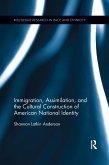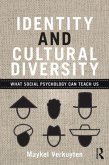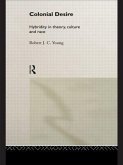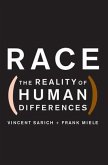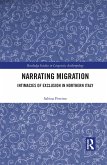Postcolonialisms
Herausgeber: Desai, Gaurav; Nair, Supriya
Postcolonialisms
Herausgeber: Desai, Gaurav; Nair, Supriya
- Broschiertes Buch
- Merkliste
- Auf die Merkliste
- Bewerten Bewerten
- Teilen
- Produkt teilen
- Produkterinnerung
- Produkterinnerung
Postcolonialisms brings together the key texts which define the study of colonial and postcolonial cultures. This expansive and clearly organized anthology offers the most up-to-date and in-depth overview of this rapidly developing field. Canonical essays explore postcolonialism's key themes of power and knowledge whilst newer articles expand the analysis to include the discovery of the New World, English colonialism in Ireland, Native American and indigenous identities in Latin America and the Pacific, settler colonies in Africa and Australia, and feminism in Nigeria and Egypt. The inclusion…mehr
Andere Kunden interessierten sich auch für
![Gender, Sexuality and National Identity in the Lives of British Lifestyle Migrants in Spain Gender, Sexuality and National Identity in the Lives of British Lifestyle Migrants in Spain]() Laura DixonGender, Sexuality and National Identity in the Lives of British Lifestyle Migrants in Spain65,99 €
Laura DixonGender, Sexuality and National Identity in the Lives of British Lifestyle Migrants in Spain65,99 €![Immigration, Assimilation, and the Cultural Construction of American National Identity Immigration, Assimilation, and the Cultural Construction of American National Identity]() Shannon Latkin AndersonImmigration, Assimilation, and the Cultural Construction of American National Identity65,99 €
Shannon Latkin AndersonImmigration, Assimilation, and the Cultural Construction of American National Identity65,99 €![Migrants and Race in the Us Migrants and Race in the Us]() Philip KretsedemasMigrants and Race in the Us59,99 €
Philip KretsedemasMigrants and Race in the Us59,99 €![Identity and Cultural Diversity Identity and Cultural Diversity]() Maykel VerkuytenIdentity and Cultural Diversity73,99 €
Maykel VerkuytenIdentity and Cultural Diversity73,99 €![Colonial Desire Colonial Desire]() Robert J C YoungColonial Desire51,99 €
Robert J C YoungColonial Desire51,99 €![Race Race]() Vincent SarichRace67,99 €
Vincent SarichRace67,99 €![Narrating Migration Narrating Migration]() Sabina PerrinoNarrating Migration65,99 €
Sabina PerrinoNarrating Migration65,99 €-
-
-
Postcolonialisms brings together the key texts which define the study of colonial and postcolonial cultures. This expansive and clearly organized anthology offers the most up-to-date and in-depth overview of this rapidly developing field. Canonical essays explore postcolonialism's key themes of power and knowledge whilst newer articles expand the analysis to include the discovery of the New World, English colonialism in Ireland, Native American and indigenous identities in Latin America and the Pacific, settler colonies in Africa and Australia, and feminism in Nigeria and Egypt. The inclusion of a broad sampling of histories and theories attests to multiple, even competing postcolonialisms.The careful organization of the volume provides a map of the field. Articles are grouped into sections. Detailed introductions to each section serve to develop key themes, encourage debate, and contextualize the wide-ranging voices intrinsic to the study of postcolonialism.
Hinweis: Dieser Artikel kann nur an eine deutsche Lieferadresse ausgeliefert werden.
Hinweis: Dieser Artikel kann nur an eine deutsche Lieferadresse ausgeliefert werden.
Produktdetails
- Produktdetails
- Verlag: Bloomsbury Publishing PLC
- Seitenzahl: 672
- Erscheinungstermin: 1. Juli 2005
- Englisch
- Abmessung: 255mm x 177mm x 32mm
- Gewicht: 1156g
- ISBN-13: 9781845203320
- ISBN-10: 1845203321
- Artikelnr.: 21355665
- Herstellerkennzeichnung
- Libri GmbH
- Europaallee 1
- 36244 Bad Hersfeld
- 06621 890
- Verlag: Bloomsbury Publishing PLC
- Seitenzahl: 672
- Erscheinungstermin: 1. Juli 2005
- Englisch
- Abmessung: 255mm x 177mm x 32mm
- Gewicht: 1156g
- ISBN-13: 9781845203320
- ISBN-10: 1845203321
- Artikelnr.: 21355665
- Herstellerkennzeichnung
- Libri GmbH
- Europaallee 1
- 36244 Bad Hersfeld
- 06621 890
Gaurav Desai is Associate Professor of English at Tulane University and author of Subject to Colonialism: African Self-fashioning and the Colonial Library. Supriya Nair is Associate Professor of English at Tulane University and author of Caliban's Curse: George Lamming and the Revisioning of History.
Introduction - Gaurav Desai and Supriya Nair Ideologies of Imperialism 1) Christopher Columbus
'Letter of Christopher Columbus on the Discovery of America' 2) Edmund Burke
'Speech in the Impeachment of Warren Hastings' 3) Frederick Lugard
'The Value of British Rule in the Tropics to British Democracy and the Native Races' The Critique of Colonial Discourse 4) Valentin Y. Mudimbe
Duke University
'Romanus Pontifex (1454) and the Expansion of Europe' 4) Aime Cesaire
Discourse on Colonialism 6) Roberto Fernandez Retamar
University of Havana
`Caliban: Notes Towards a Discussion of Culture in Our America' 7) Edward Said
Columbia University
'Introduction' to Orientalism 8) Linda Tuhiwai Smith
University of Auckland
New Zealand
`Imperialism
History
Writing and Theory' The Politics of Language and Literary Studies 9) Thomas Macaulay
'Minute on Indian Education' 10) Alexander Crummell
'The English Language in Liberia' 11) Ngugi wa Thiongo
NYU
'The Language of African Literature' 12) Carolyn Cooper
University of the West Indies (UWI)
Mona
'Writing Oral History: Sistren Theatre Collective's Lionheart Gal' Nationalisms and Nativisms 13) Leopold Senghor
cole Nationale de la France d'Outre-Mer
'Negritude: A Humanism of the Twentieth Century' 14) Chinweizu
Onwuchekwa Jemie and Ihechukwu Madubuike
`The African Novel and its Critics (1950-1975)' 15) Frantz Fanon
'On National Culture' 16) Paul Gilroy
Yale
`The Tyrannies of Unanimism' Hybrid Identities 17) Octave Mannoni
'The Threat of Abandonment' 18) Derek Walcott
Boston University
'The Caribbean: Culture or Mimicry?' 19) Homi Bhabha
Harvard
'Of Mimicry and Man' 20) Jean Bernabe
Patrick Chamoiseau and Raphael Confiant
'In Praise of Creoleness' 21) Jana Sequoya
'How(!) is an Indian?: A Contest of Stories' Gender and Sexualities 22) Leila Ahmed
Harvard Divinity School
'The Discourse of the Veil' 23) Oyeronke Oyewumi
Stony Brook
State University of New York
'Colonising Bodies and Minds: Gender and Colonialism' 24) Gayatri Chakravorty Spivak
Columbia University
'Three Women's Texts and a Critique of Imperialism' 25) Timothy Chin
California State University
Dominguez Hills
'Bullers and Battymen: Contesting Homophobia in Black Popular Culture and Contemporary Caribbean Literature' Reading the Subaltern 26) Ranajit Guha
formerly of Australian National University
Canberra
'On some Aspects of the Historiography of Colonial India' 27) David Lloyd
University of Southern California
'Outside History: Irish New Histories and the 'Subalternity Effect'' 28) John Beverley
University of Pittsburgh
'Our Rigoberta? I
Rigoberta Menchu
Cultural Authority and the Problem of Subaltern Agency' 29) Nicholas Thomas
Goldsmiths University of London
'The Primitivist and the Postcolonial' Comparative (Post)colonialisms 30) `Apology Bill
Public Law 103-150' 31) Amy Kaplan
University of Pennsylvania
'Manifest Domesticity' 32) Pal Ahluwalia
Goldsmith University of London
'When does a Settler become a Native? Citizenship and Identity in a Settler Society' 33) David Chioni Moore
Macalester College
'Is the Post- in Postcolonial the Post- in Post-Soviet?' Globalization and Postcoloniality 34) Stuart Hall
The Open University
'Thinking the Diaspora: Home-Thoughts from Abroad' 35) Arif Dirlik
University of Oregon
'The Postcolonial Aura: Third World Criticism in the Age of Global Capitalism' 36) Rey Chow
Brown University
'Against the Lures of Diaspora' 37) Simon Gikandi
Princeton University
'Globalization and the Claims of Postcoloniality'
'Letter of Christopher Columbus on the Discovery of America' 2) Edmund Burke
'Speech in the Impeachment of Warren Hastings' 3) Frederick Lugard
'The Value of British Rule in the Tropics to British Democracy and the Native Races' The Critique of Colonial Discourse 4) Valentin Y. Mudimbe
Duke University
'Romanus Pontifex (1454) and the Expansion of Europe' 4) Aime Cesaire
Discourse on Colonialism 6) Roberto Fernandez Retamar
University of Havana
`Caliban: Notes Towards a Discussion of Culture in Our America' 7) Edward Said
Columbia University
'Introduction' to Orientalism 8) Linda Tuhiwai Smith
University of Auckland
New Zealand
`Imperialism
History
Writing and Theory' The Politics of Language and Literary Studies 9) Thomas Macaulay
'Minute on Indian Education' 10) Alexander Crummell
'The English Language in Liberia' 11) Ngugi wa Thiongo
NYU
'The Language of African Literature' 12) Carolyn Cooper
University of the West Indies (UWI)
Mona
'Writing Oral History: Sistren Theatre Collective's Lionheart Gal' Nationalisms and Nativisms 13) Leopold Senghor
cole Nationale de la France d'Outre-Mer
'Negritude: A Humanism of the Twentieth Century' 14) Chinweizu
Onwuchekwa Jemie and Ihechukwu Madubuike
`The African Novel and its Critics (1950-1975)' 15) Frantz Fanon
'On National Culture' 16) Paul Gilroy
Yale
`The Tyrannies of Unanimism' Hybrid Identities 17) Octave Mannoni
'The Threat of Abandonment' 18) Derek Walcott
Boston University
'The Caribbean: Culture or Mimicry?' 19) Homi Bhabha
Harvard
'Of Mimicry and Man' 20) Jean Bernabe
Patrick Chamoiseau and Raphael Confiant
'In Praise of Creoleness' 21) Jana Sequoya
'How(!) is an Indian?: A Contest of Stories' Gender and Sexualities 22) Leila Ahmed
Harvard Divinity School
'The Discourse of the Veil' 23) Oyeronke Oyewumi
Stony Brook
State University of New York
'Colonising Bodies and Minds: Gender and Colonialism' 24) Gayatri Chakravorty Spivak
Columbia University
'Three Women's Texts and a Critique of Imperialism' 25) Timothy Chin
California State University
Dominguez Hills
'Bullers and Battymen: Contesting Homophobia in Black Popular Culture and Contemporary Caribbean Literature' Reading the Subaltern 26) Ranajit Guha
formerly of Australian National University
Canberra
'On some Aspects of the Historiography of Colonial India' 27) David Lloyd
University of Southern California
'Outside History: Irish New Histories and the 'Subalternity Effect'' 28) John Beverley
University of Pittsburgh
'Our Rigoberta? I
Rigoberta Menchu
Cultural Authority and the Problem of Subaltern Agency' 29) Nicholas Thomas
Goldsmiths University of London
'The Primitivist and the Postcolonial' Comparative (Post)colonialisms 30) `Apology Bill
Public Law 103-150' 31) Amy Kaplan
University of Pennsylvania
'Manifest Domesticity' 32) Pal Ahluwalia
Goldsmith University of London
'When does a Settler become a Native? Citizenship and Identity in a Settler Society' 33) David Chioni Moore
Macalester College
'Is the Post- in Postcolonial the Post- in Post-Soviet?' Globalization and Postcoloniality 34) Stuart Hall
The Open University
'Thinking the Diaspora: Home-Thoughts from Abroad' 35) Arif Dirlik
University of Oregon
'The Postcolonial Aura: Third World Criticism in the Age of Global Capitalism' 36) Rey Chow
Brown University
'Against the Lures of Diaspora' 37) Simon Gikandi
Princeton University
'Globalization and the Claims of Postcoloniality'
Introduction - Gaurav Desai and Supriya Nair Ideologies of Imperialism 1) Christopher Columbus
'Letter of Christopher Columbus on the Discovery of America' 2) Edmund Burke
'Speech in the Impeachment of Warren Hastings' 3) Frederick Lugard
'The Value of British Rule in the Tropics to British Democracy and the Native Races' The Critique of Colonial Discourse 4) Valentin Y. Mudimbe
Duke University
'Romanus Pontifex (1454) and the Expansion of Europe' 4) Aime Cesaire
Discourse on Colonialism 6) Roberto Fernandez Retamar
University of Havana
`Caliban: Notes Towards a Discussion of Culture in Our America' 7) Edward Said
Columbia University
'Introduction' to Orientalism 8) Linda Tuhiwai Smith
University of Auckland
New Zealand
`Imperialism
History
Writing and Theory' The Politics of Language and Literary Studies 9) Thomas Macaulay
'Minute on Indian Education' 10) Alexander Crummell
'The English Language in Liberia' 11) Ngugi wa Thiongo
NYU
'The Language of African Literature' 12) Carolyn Cooper
University of the West Indies (UWI)
Mona
'Writing Oral History: Sistren Theatre Collective's Lionheart Gal' Nationalisms and Nativisms 13) Leopold Senghor
cole Nationale de la France d'Outre-Mer
'Negritude: A Humanism of the Twentieth Century' 14) Chinweizu
Onwuchekwa Jemie and Ihechukwu Madubuike
`The African Novel and its Critics (1950-1975)' 15) Frantz Fanon
'On National Culture' 16) Paul Gilroy
Yale
`The Tyrannies of Unanimism' Hybrid Identities 17) Octave Mannoni
'The Threat of Abandonment' 18) Derek Walcott
Boston University
'The Caribbean: Culture or Mimicry?' 19) Homi Bhabha
Harvard
'Of Mimicry and Man' 20) Jean Bernabe
Patrick Chamoiseau and Raphael Confiant
'In Praise of Creoleness' 21) Jana Sequoya
'How(!) is an Indian?: A Contest of Stories' Gender and Sexualities 22) Leila Ahmed
Harvard Divinity School
'The Discourse of the Veil' 23) Oyeronke Oyewumi
Stony Brook
State University of New York
'Colonising Bodies and Minds: Gender and Colonialism' 24) Gayatri Chakravorty Spivak
Columbia University
'Three Women's Texts and a Critique of Imperialism' 25) Timothy Chin
California State University
Dominguez Hills
'Bullers and Battymen: Contesting Homophobia in Black Popular Culture and Contemporary Caribbean Literature' Reading the Subaltern 26) Ranajit Guha
formerly of Australian National University
Canberra
'On some Aspects of the Historiography of Colonial India' 27) David Lloyd
University of Southern California
'Outside History: Irish New Histories and the 'Subalternity Effect'' 28) John Beverley
University of Pittsburgh
'Our Rigoberta? I
Rigoberta Menchu
Cultural Authority and the Problem of Subaltern Agency' 29) Nicholas Thomas
Goldsmiths University of London
'The Primitivist and the Postcolonial' Comparative (Post)colonialisms 30) `Apology Bill
Public Law 103-150' 31) Amy Kaplan
University of Pennsylvania
'Manifest Domesticity' 32) Pal Ahluwalia
Goldsmith University of London
'When does a Settler become a Native? Citizenship and Identity in a Settler Society' 33) David Chioni Moore
Macalester College
'Is the Post- in Postcolonial the Post- in Post-Soviet?' Globalization and Postcoloniality 34) Stuart Hall
The Open University
'Thinking the Diaspora: Home-Thoughts from Abroad' 35) Arif Dirlik
University of Oregon
'The Postcolonial Aura: Third World Criticism in the Age of Global Capitalism' 36) Rey Chow
Brown University
'Against the Lures of Diaspora' 37) Simon Gikandi
Princeton University
'Globalization and the Claims of Postcoloniality'
'Letter of Christopher Columbus on the Discovery of America' 2) Edmund Burke
'Speech in the Impeachment of Warren Hastings' 3) Frederick Lugard
'The Value of British Rule in the Tropics to British Democracy and the Native Races' The Critique of Colonial Discourse 4) Valentin Y. Mudimbe
Duke University
'Romanus Pontifex (1454) and the Expansion of Europe' 4) Aime Cesaire
Discourse on Colonialism 6) Roberto Fernandez Retamar
University of Havana
`Caliban: Notes Towards a Discussion of Culture in Our America' 7) Edward Said
Columbia University
'Introduction' to Orientalism 8) Linda Tuhiwai Smith
University of Auckland
New Zealand
`Imperialism
History
Writing and Theory' The Politics of Language and Literary Studies 9) Thomas Macaulay
'Minute on Indian Education' 10) Alexander Crummell
'The English Language in Liberia' 11) Ngugi wa Thiongo
NYU
'The Language of African Literature' 12) Carolyn Cooper
University of the West Indies (UWI)
Mona
'Writing Oral History: Sistren Theatre Collective's Lionheart Gal' Nationalisms and Nativisms 13) Leopold Senghor
cole Nationale de la France d'Outre-Mer
'Negritude: A Humanism of the Twentieth Century' 14) Chinweizu
Onwuchekwa Jemie and Ihechukwu Madubuike
`The African Novel and its Critics (1950-1975)' 15) Frantz Fanon
'On National Culture' 16) Paul Gilroy
Yale
`The Tyrannies of Unanimism' Hybrid Identities 17) Octave Mannoni
'The Threat of Abandonment' 18) Derek Walcott
Boston University
'The Caribbean: Culture or Mimicry?' 19) Homi Bhabha
Harvard
'Of Mimicry and Man' 20) Jean Bernabe
Patrick Chamoiseau and Raphael Confiant
'In Praise of Creoleness' 21) Jana Sequoya
'How(!) is an Indian?: A Contest of Stories' Gender and Sexualities 22) Leila Ahmed
Harvard Divinity School
'The Discourse of the Veil' 23) Oyeronke Oyewumi
Stony Brook
State University of New York
'Colonising Bodies and Minds: Gender and Colonialism' 24) Gayatri Chakravorty Spivak
Columbia University
'Three Women's Texts and a Critique of Imperialism' 25) Timothy Chin
California State University
Dominguez Hills
'Bullers and Battymen: Contesting Homophobia in Black Popular Culture and Contemporary Caribbean Literature' Reading the Subaltern 26) Ranajit Guha
formerly of Australian National University
Canberra
'On some Aspects of the Historiography of Colonial India' 27) David Lloyd
University of Southern California
'Outside History: Irish New Histories and the 'Subalternity Effect'' 28) John Beverley
University of Pittsburgh
'Our Rigoberta? I
Rigoberta Menchu
Cultural Authority and the Problem of Subaltern Agency' 29) Nicholas Thomas
Goldsmiths University of London
'The Primitivist and the Postcolonial' Comparative (Post)colonialisms 30) `Apology Bill
Public Law 103-150' 31) Amy Kaplan
University of Pennsylvania
'Manifest Domesticity' 32) Pal Ahluwalia
Goldsmith University of London
'When does a Settler become a Native? Citizenship and Identity in a Settler Society' 33) David Chioni Moore
Macalester College
'Is the Post- in Postcolonial the Post- in Post-Soviet?' Globalization and Postcoloniality 34) Stuart Hall
The Open University
'Thinking the Diaspora: Home-Thoughts from Abroad' 35) Arif Dirlik
University of Oregon
'The Postcolonial Aura: Third World Criticism in the Age of Global Capitalism' 36) Rey Chow
Brown University
'Against the Lures of Diaspora' 37) Simon Gikandi
Princeton University
'Globalization and the Claims of Postcoloniality'



